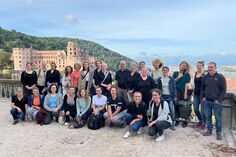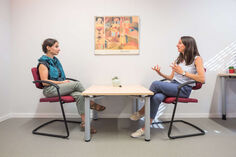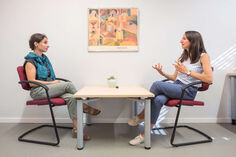2022
Zeitschriftenbeiträge
Aguilar-Raab, C., Winter, F., Jarczok, M. N., Ditzen, B. & Warth, M. (2022). Feeling low and unhappy together? An actor-partner-interdependence model uncovering the linkage between different operationalizations of relationship quality and depression in different-sex couples. PLOS ONE, 17(11), e0274756. https://doi.org/10.1371/journal.pone.0274756
Becker S, Spinath B, Ditzen B, Dörfler T.(2022). Psychological Stress = Physiological Stress? Journal of Psychophysiology.http://dx.doi.org/10.1027/0269-8803/a000301
Becker S, Spinath B, Ditzen B, Doerfler T.(2022). Den Stress im Blick – lokale Blickbewegungsmaße bei der Einschätzung schwierigkeitsgenerierender Merkmale von mathematischen Textaufgaben unter Stress/ Keeping an Eye on Stress – Local Measures of Eye Movements During Diagnosing Difficulty-Generating Features of Mathematical Word Problems under Stress. Journal für Mathematik-Didaktik. https://doi.org/10.1007/s13138-022-00209-7
Biggel F., Ditzen B., Frech F., Lober M., Patzel-Mattern K., Schulz A., Weller M.P. Elternschaft im Wandel: From
status to contract? Archiv für die civilistische Praxis 2021;6(44). DOI: 10.1628/acp-2021-0035
Dikow N, Ditzen B, Kölker S, Hoffmann G, Schaaf C. (2022). From newborn screening to genomic medicine: challenges and suggestions on how to incorporate genomic newborn screening in public health programs. Medizinische Genetik, 34(1): 13-20. https://doi.org/10.1515/medgen-2022-2113
Ditzen B. (2022). When intimate relationships improve immune functioning: More than a gut feeling. Brain, behavior, and immunity, 103, 10–11. https://doi.org/10.1016/j.bbi.2022.03.011
Ditzen B, Aguilar-Raab C, Winter F, Hernández C, Schneider E, Läuchli S, et al.(2022): Effects of intranasal oxytocin and positive couple interaction on immune factors in skin wounds. Brain Behavior and Immunity. https://doi.org/10.1016/j.bbi.2022.08.011
Doerr, J. M., Klaus, K., Troxel, W., Nater, U. M., Bodenmann, G., Heinrichs, M., Ehlert, U., & Ditzen, B. (2022). The Effect of Intranasal Oxytocin on the Association Between Couple Interaction and Sleep: A Placebo-Controlled Study. Psychosomatic medicine, 84(6), 727–737. https://doi.org/10.1097/PSY.0000000000001091
Dreisoerner, A., Junker, N. M., Schlotz, W., Heimrich, J., Bloemeke, S., Ditzen, B., & van Dick, R. (2021). Self-soothing touch and being hugged reduce cortisol responses to stress: A randomized controlled trial on stress, physical touch, and social identity. Comprehensive psychoneuroendocrinology, 8, 100091. https://doi.org/10.1016/j.cpnec.2021.100091
Eckstein M, Stoessel G, Gerchen MF, Bilek E, Kirsch P, Ditzen B.(2022). Neural responses to instructed positive couple interaction: An fMRI study on compliment sharing. preprint. https://doi.org/10.1101/2022.06.15.496238
Haufler A, Ditzen B, Schüler J. (2022). Social Support as a Stress Buffer or Stress Amplifier: The Moderating Role of Social Motives. preprint.https://doi.org/10.21203/rs.3.rs-781012/v1
Hopf D, Eckstein M, Ditzen B, Aguilar-Raab C (2022). Still With Me? Assessing the Persisting Relationship to a Deceased Loved-One-Validation of the “Continuing Bonds Scale” in a German Population. OMEGA J Death and Dying. https://doi.org/10.1177/00302228221076622
Hopf D, Schneider E, Aguilar-Raab C, Scheele D, Ditzen B, Eckstein M. (2022). Loneliness and diurnal cortisol levels during COVID-19 lockdown: the roles of living situation, relationship status and relationship quality. Scientifc Reports, 12:15076. https://doi.org/10.1038/s41598-022-19224-2
Iwasaki M, Lefevre A, Althammer F, Łąpieś O, Hilfiger L, Kerspern D, et al.(2002). A novel analgesic pathway from parvocellular oxytocin neurons to the periaqueductal gray. preprint. https://doi.org/10.1101/2022.02.23.481531
Jansen C, Kuhlmann E, Scharli P, Schick M, Ditzen B, Langer L, et al.(2022).“A sorrow shared …”: a qualitative content analysis of what couples with recurrent miscarriages expect from one another and their families and friends. Human Reproduction Open. https://doi.org/10.1093/hropen/hoac032
Kexel, A. K., Kluwe-Schiavon, B., Baumgartner, M. R., Engeli, E. J. E., Visentini, M., Kirschbaum, C., Seifritz, E., Ditzen, B., Soravia, L. M. & Quednow, B. B. (2022). Cue-induced cocaine craving enhances psychosocial stress and vice versa in chronic cocaine users. Translational Psychiatry, 12(1). https://doi.org/10.1038/s41398-022-02204-5
Koehler F, Kessler J, Stoffel M, Weber M, Bardenheuer HJ, Ditzen B, Warth M.(2022). Psychoneuroendocrinological effects of music therapy versus mindfulness in palliative care: Results from the ‘Song of Life’ randomized controlled trial. Support Care Cancer, 30, 625–634. https://doi.org/10.1007/s00520-021-06435-y
Leeners B, Tschudin S, Wischmann T, Kalaitzopoulos D (2022): Sexual dysfunction and disorders as a consequence of infertility: a systematic review and meta-analysis. https://doi.org/10.1093/humupd/dmac030
Mayer, G., Gronewold, N., Polte, K., Hummel, S., Barniske, J., Korbel, J. J., Zarnekow, R. & Schultz, J. H. (2022). Experiences of Patients and Therapists Testing a Virtual Reality Exposure App for Symptoms of Claustrophobia: Mixed Methods Study. JMIR Mental Health, 9(12), e40056. doi: 10.2196/40056
Mayer C, Mahal J, Schmalenberger K, Wekenborg M, Georg A, Ditzen B.(2022). Psychosoziale Aspekte der digitalisierten Medizin und deren Integration in die Lehre für Studierende der Humanmedizin. PPmP - Psychotherapie Psychosomatik Medizinische Psychologie, 72(08),341-4. DOI: 10.1055/a-1840-7285
Müller M, ZAL, Klauser N, Woll C, Nonnenmacher N, Tronick E, Reck C. (2022). From Early Micro-Temporal Interaction Patterns to Child Cortisol Levels: Toward the Role of Interactive Reparation and Infant Attachment in a Longitudinal Study. Front Psychol. 12:807157. https://doi.org/10.3389/fpsyg.2021.807157
Rashidi M, Maier E, Dekel S, Suetterlin M, Wolf R, Ditzen B, et al.(2022). Peripartum effects of synthetic oxytocin: The good, the bad, and the unknown. Neuroscience & Biobehavioral Reviews, 41.https://doi.org/10.1016/j.neubiorev.2022.104859
Rittner, S (2022): HöBAt – eine Achtsamkeits- und Tranceinduktionsmethode für Alltag und Therapie. In: Decker-Voigt H-H, Spintge R, Weymann E, Schmidt H U (Hg.): Musik und Gesundsein 41/2022. Wiesbaden: Reichert.
Rittner, S (2022): Klangfarben - Farbklänge. In: Decker-Voigt H-H, Spintge R, Weymann E, Schmidt H U (Hg.): Musik und Gesundsein 42/2022. Wiesbaden: Reichert.
Schick M, Germeyer A, Böttcher B, Hecht S, Geiser M, Rösner S, Eckstein M, Vomstein K, Toth B, Strowitzki T, Wischmann T, Ditzen B (2022). Partners matter: The psychosocial well-being of couples when dealing with endometriosis. Health and Quality of Life Outcomes. https://doi.org/10.1186/s12955-022-01991-1
Siegel M, Randall AK, Lannutti PJ, Fischer M, Gandhi Y, Lukas R, et al.(2022). A Tri-Nation Study on Associations between Positive Minority Identity Aspects and Relationship Quality in Sexual Minorities from German-Speaking Countries. International journal of applied positive psychology. https://doi.org/10.1007/s41042-022-00070-6
Schneider E, Hopf D, Aguilar-Raab C, Scheele D, Neubauer AB, Sailer U, et al.(2022). Using Citizen Science During COVID-19 to Illuminate the Stress-Alleviating Effects of Daily Touch on Hormonal Biomarkers and Subjective Measures of Well-Being. SSRN Electronic Journal.https://dx.doi.org/10.2139/ssrn.4068369
Schröder-Pfeifer, P., Georg, A. K., Talia, A., Volkert, J., Ditzen, B., & Taubner, S. (2022). The Epistemic Trust Assessment—An experimental measure of epistemic trust. Psychoanalytic Psychology, 39(1), 50–58. https://doi.org/10.1037/pap000032
Schüler, J., Haufler, A., & Ditzen, B. (2022). Social Support as a Stress Buffer or Stress Amplifier and the Moderating Role of Implicit Motives: Protocol for a Randomized Study. JMIR research protocols, 11(8), e39509. https://doi.org/10.2196/39509
Siegel, M., Randall, A.K., Lannutti, P.J. et al.(2022). Intimate Pride: a Tri-Nation Study on Associations between Positive Minority Identity Aspects and Relationship Quality in Sexual Minorities from German-Speaking Countries. Int J Appl Posit Psychol. https://doi.org/10.1007/s41042-022-00070-6
Van Stein K., Eckstein M. , Schick M., Wischmann T., Ditzen B., Germeyer A., Marschall A. (2022). Hormonelle und soziale Einflüsse auf Endometriose-Schmerzen. Geburtshilfe und Frauenheilkunde 2022. 82(10): e175-e176. DOI: 10.1055/s-0042-1757084
Warth, M., Stoffel, M., Koehler, F., Bardenheuer, H. J., Kessler, J. & Ditzen, B. (2022). Characteristics of salivary cortisol and alpha-amylase as psychobiological study outcomes in palliative care research. BMC Palliative Care, 21(1). https://doi.org/10.1186/s12904-022-01085-1
Winter F, Jarczok MN, Warth M, Hembd-Peuse S, Ditzen B, Aguilar-Raab C (2022). A new way to measure partner burden in depression: Construction, validation and sensitivity to change of the partner burden in depression questionnaire. Journal of Marital and Family Therapy, 1– 17. https://doi.org/10.1111/jmft.12584
Winter F, Mander J, Jarczok MN, Warth M, Negi LT, Harrison T, Ditzen B, Aguilar-Raab C (2022). Change Mechanisms of Cognitively-Based Compassion Training for Couples with Depression: An Exploratory Empirical Investigation of Process Variables. Journal of Integrative and Complementary Medicine. http://doi.org/10.1089/jicm.2022.0497
Wischmann T, Thorn P (2022). When ART Fails: Figures, Experiences, Interventions and a Plea for the “Plan B” J Assist Reprod Genetics 39: 195-199. https://doi.org/10.1007/s10815-021-02388-7
Wischmann, T., Zacher, M. & Ditzen, B.(2022). Psychischer Stress – Implikationen für Schwangerschaftseintritt und -verlauf. Gynäkologische Endokrinologie 20, 85–92. https://doi.org/10.1007/s10304-022-00443-9
Wischmann, T., Zacher, M., & Ditzen, B. (2022). Schadet psychischer Stress in der Schwangerschaft?. Hebammen Wissen, 3(3), 46-50. https://doi.org/10.1007/s00404-022-06612-2
Zacher, M., Wollanka, N., Sauer, C., Haßtenteufel, K., Wallwiener, S., Wallwiener, M., & Maatouk, I. (2022). Prenatal paternal depression, anxiety, and somatic symptom burden in different risk samples: an explorative study. Archives of Gynecology and Obstetrics, 1-9.https://doi.org/10.1007/s00404-022-06612-2
Zietlow A, Woll CFJ, Nonnenmacher N, et al (2022). Study protocol of the COMPARE-Interaction study: the impact of maternal comorbid depression and anxiety disorders in the peripartum period on child development. BMJ Open;12:e050437. doi: 10.1136/bmjopen-2021-050437
Buchbeiträge
Kirsch, P. & Ditzen, B. (2022). Neuromodulatorische Einflüsse auf das Wohlbefinden: Dopamin und Oxytocin. In: Frank, R. & Flückiger, C. (Hrsg.) Therapieziel Wohlbefinden. Psychotherapie: Praxis. Springer, Berlin, Heidelberg. https://doi.org/10.1007/978-3-662-63821-7_4
Wallraff, D., Thorn, P., & Wischmann, T. (2022). Kinderwunsch: Der Ratgeber des Beratungsnetzwerkes Kinderwunsch Deutschland (BKiD). Kohlhammer, Stuttgart (2. Aufl.).
Herausgeberschaften / Monographien
Sonstige
Küchler, G. & Aguilar-Raab, C. (2023, 10. Januar). Gelassener im Alltag werden – hier kann es jeder lernen. Schwetzingen - Nachrichten und Informationen. www.schwetzinger-zeitung.de/orte/schwetzingen_artikel,-schwetzingen-gelassener-im-alltag-werden-hier-kann-es-jeder-lernen-_arid,2038470.html
Ditzen B. Partnerschaft und Gesundheit - Psychobiologische Mechanismen. In: Pekkip K, editor. Heidelberg: Lions Club Mittlere Bergstraße; 2022.
Ditzen B. Stress und Stressprotektion in sozialen Beziehungen - Einfluss auf den Körper. In: Draguhn A, editor. Lehrerfortbildung: Großhirn an Nebenniere - Was Sie schon immer über Stress wissen wollten. Heidelberg (online)2022.
Ditzen B. Transition ins Pensionsalter. Heicumed-Wahlfachtrack-Vortrag. ZPM-Bibliothek 2022.
Ditzen B. Bindung als vermittelnder Mechanismus bei der Weitergabe von Normen, Werten und biopsychologischen Variablen zwischen den Generationen. Human Reproduction Reloaded. Zürich, Schweiz: Universität Zürich Universitäre Forschungsschwerpunkte (UFSP); 2022.
Ditzen B. Bio-psychologische Grundlagen der Paarinteraktion. Tagung Kirchenrecht im Dialog II. Bischöfliches Priesterseminar der Diözese Fulda; 2022.
Ditzen B. Partnerschaft: Belastungsfaktoren und Ressourcen. Heidelberger Forum Schmerztherapie. Neue Chirurgische Universitätklinik, Heidelberg: Klinik für Anästhesiologie; 2022.
Borgdorf, K. & Küchler, G. (2. Januar 2023) Damit es nicht bei den guten Vorsätzen bleibt. Rhein-Neckar-Zeitung. www.rnz.de/region/heidelberg_artikel,-_arid,1031769.html
Zacher M., Zipser B. (2022,08.09). Wochenbettdepression – Wenn das Mutterglück ausbleibt [Radiosendung]. SWR2. https://www.swr.de/swr2/wissen/wochenbettdepression-wenn-das-mutterglueck-ausbleibt-swr2-wissen-2022-09-08-100.html




